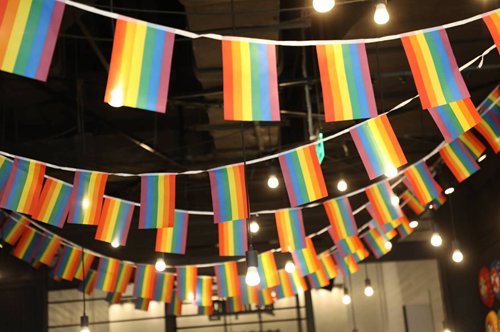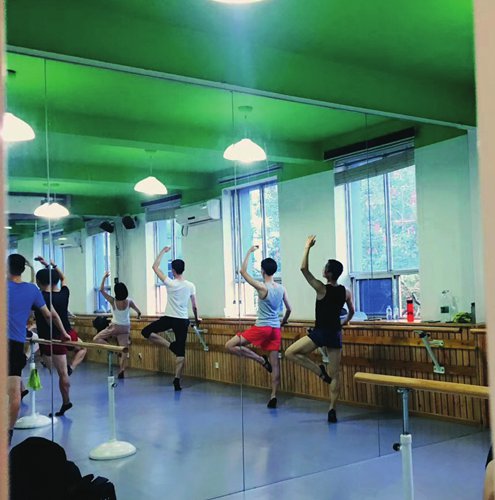HOME >> METRO BEIJING
Guide to Beijing’s most LGBTQ-friendly locations
By Wei Xi and Li Jieyi Source:Global Times Published: 2019/6/25 20:03:40

Photo: Courtesy of Beijing LGBT Center

A ballet class at Destination Photo: Courtesy of Destination
Where do LGBTQ groups hang out in Beijing? That may be an interesting question for both LGBTQ people as well as straight people since Beijing, China's capital city, is seldom associated with the term queer.
But in fact, according to a 2016 report issued by the gay social network app Blued, Beijing has the highest number of LGBTQ people in China, followed by Guangdong Province, Jiangsu Province and Shandong Province.
And another survey co-organized by Blued, mobile news aggregator Yidian Zixun, and Chinese web mapping provider Gaode in the same year, showed that Sanlitun, a fashion and commercial hub in Beijing, is the most popular area for gay people, and one out of five males (20 percent) identified themselves as gay.
"I think the social environment in Beijing, compared with Hong Kong and Singapore, is more inclusive toward LGBT people," said Edmund Yang, one of the founders of Destination, which is a famous LGBTQ-friendly location around the Sanlitun area.
Yang, who came from Hong Kong and now has worked in Beijing for about 27 years, set up Destination in 2004 with a group of friends.
"I am a person who loves music, but during my early years, my friends and I found there were not many places for gay people [to hang out] in Beijing, so we decided to open a nightclub ourselves," Yang said.
Destination developed into more than a nightclub over the years. Art exhibitions, ballet classes, and screenings are regular events, and there are other activities like career salons, beverage sampling and craft classes that alternate every week.
"Many people's impression of gay people is that they are a group of people who like the night life a lot and are very social, but in fact gay people and straight people are not much different when it comes to hobbies," Yang said. "Basically we are the same."
Yang hopes that Destination can serve as a place where people with different sexual orientations understand each other better.
The Beijing LGBT Center, an NGO, is also trying to encourage the LGBTQ community to better understand themselves and build a communication bridge with straight people. The center's headquarters is located in Chaoyang district, and it organizes activities across the city.
Picnic Out, for example, is an annual event during the summer. "It's when people get together to eat and drink on a large patch of grass," said Sachi (pseudonym), who works at the transgender services at the Beijing LGBT Center.
She also introduced the quarterly Drag Brunch and the "trans space" activity that is held at the center every week, which helps transgender people to build confidence and "to feel proud with nothing to hide."
Coming from Inner Mongolia Autonomous Region and having worked in the center for over a year, Sachi has a clear feeling that both LGBTQ people and the Beijing society are changing.
She noted that social phobia is the biggest obstacle for many transgender people, and therefore they often meet friends online. "But slowly you will see more and more people who are willing to meet in real life and talk," Sachi told the Global Times.
Kevin (pseudonym), a college student from Hong Kong who studies in Beijing, recalled a very memorable experience from watching the film Tracey (2018) at Destination, where Travis Tung (Philip Keung) appears as a woman in his 50s.
"I am very much touched by the film and to see myself as Tung's character," said Kevin.
"I have been suppressing myself for a long time…but I am braver to become the true me in the future," he added.
The 20-something youngster wore a yellow T-shirt that night, which had the French words "je peux, je veux" (I can, I want).
A national survey on the social attitude towards sexual orientation, gender identity and gender expression conducted in 2017, which was carried out by the United Nations Development Programme, showed that 70 percent of all the non-sexual minority respondents in China surveyed were not supportive of the pathological view of homosexuals, stereotypes of minorities, gender binary ideas, or gay-related HIV stigma.
Louis (pseudonym), who is a member of the Beijing Queer Chorus, introduced that their chorus not only consists of LGBTQ people, but many straight people who are willing to join as well. And their goal is to "use tenderness of songs to change the world."
Yang, who also works in a company in Beijing, agrees that today's people are more inclusive towards homosexuals. "Especially our young colleagues here. They have a very open mind."
Besides Destination, Beijing LGBT Center and Queer Chorus, there are many other LGBTQ-friendly locations in Beijing such as "bars like Anchor and Rabbit to name a few," Louis added.
Newspaper headline: Ancient city’s young and open hearts
Posted in: METRO BEIJING,CULTURE